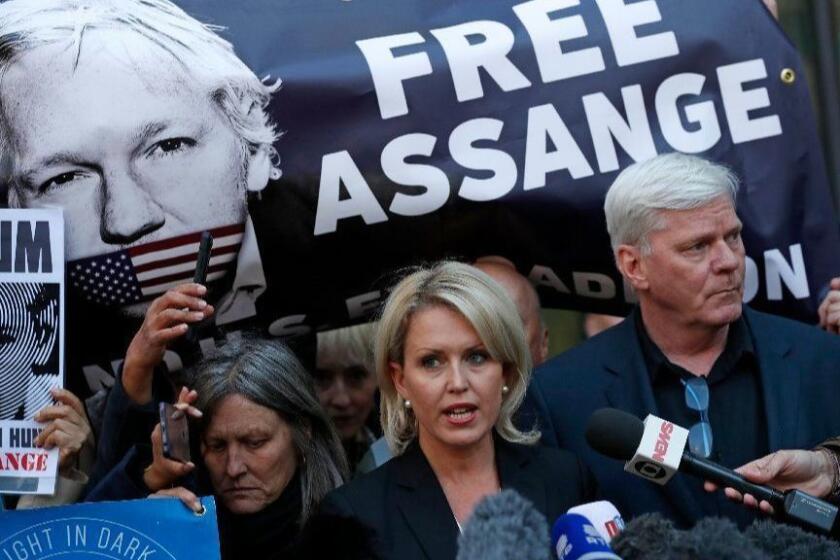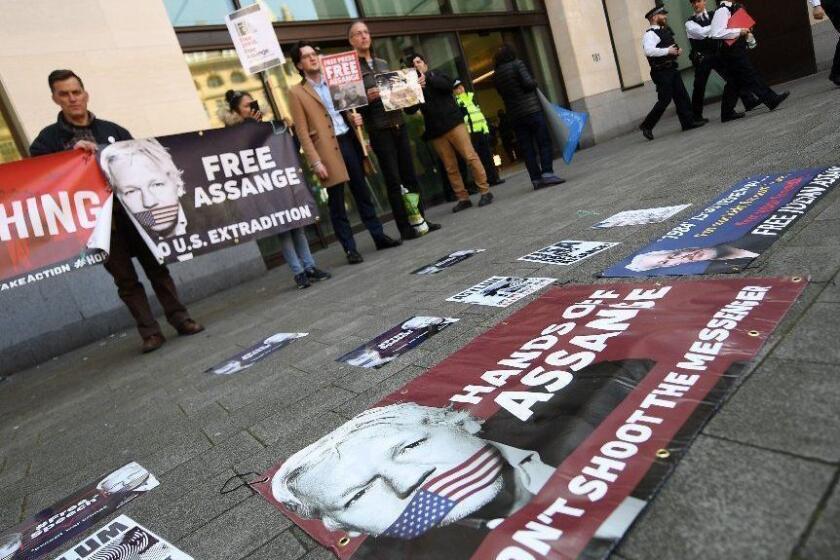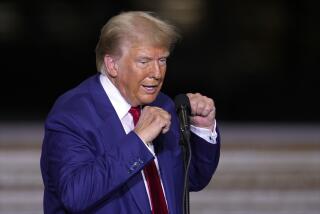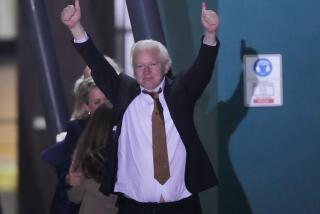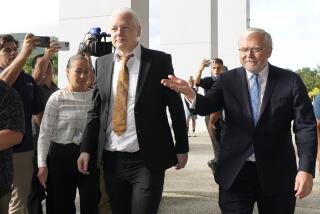U.S. asks British court to permit extradition of WikiLeaks’ Assange
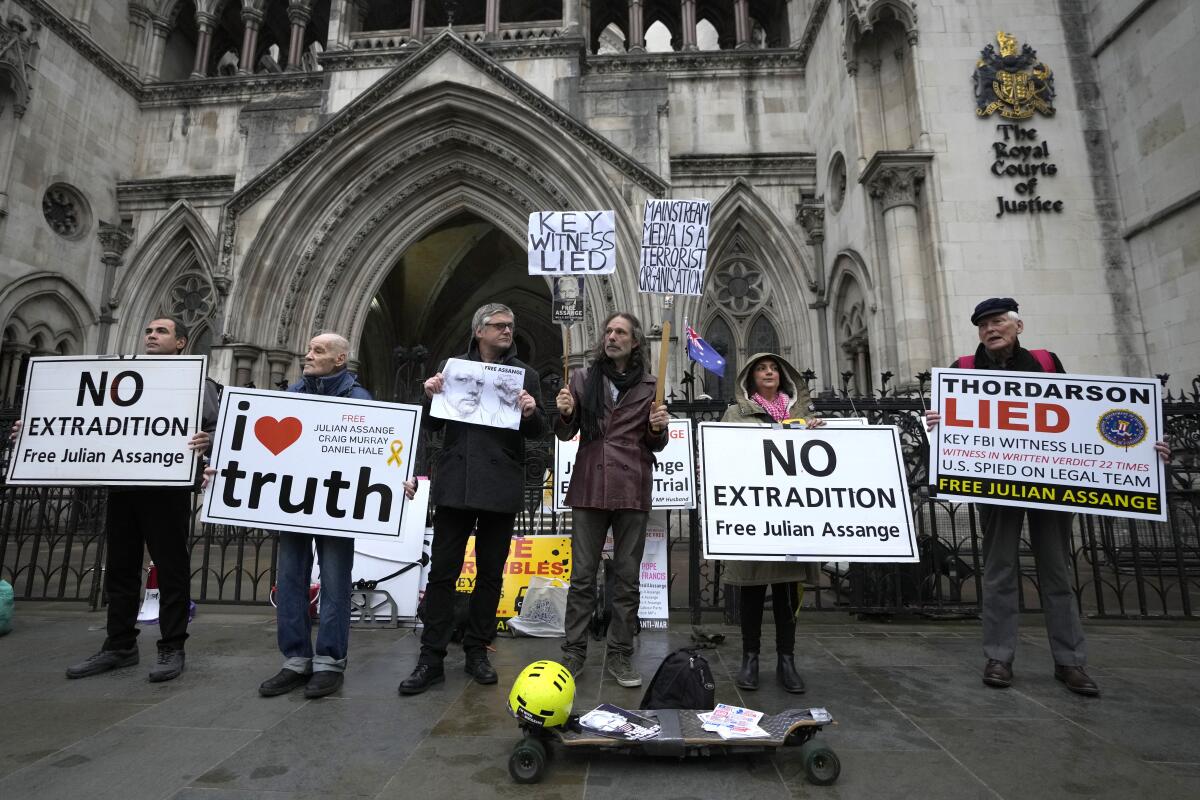
- Share via
LONDON — The United States asked Britain’s High Court on Wednesday to overturn a judge’s decision that WikiLeaks founder Julian Assange should not be extradited to face espionage charges, promising that he would be able to serve any prison sentence he receives in his native Australia.
In January, a lower court judge refused a U.S. request to extradite Assange on spying charges over WikiLeaks’ publication of secret military documents a decade ago. District Judge Vanessa Baraitser denied extradition on health grounds, saying Assange was likely to kill himself if held under harsh U.S. prison conditions.
An attorney for the U.S. government, James Lewis, argued Wednesday that the judge erred when she ruled that Assange would be at risk of suicide because of the oppressive conditions. He said American authorities had promised that Assange would not be held before trial in a top-security “supermax” prison or be subjected to strict isolation conditions, and if convicted would be allowed to serve his sentence in Australia.
Lewis said the assurances “are binding on the United States.”
U.S. authorities also argue that Assange does not meet the threshold of being so ill that he cannot resist harming himself.
Lewis said Assange did “not even come close to having an illness of this degree.”
With his shock of Warhol-white hair, black leather jacket and self-proclaimed mission to lay bare official malfeasance, Australian-born Julian Assange burst onto the world stage more than a decade ago with his creation of the WikiLeaks website.
“Once there is an assurance of appropriate medical care, once it is clear he will be repatriated to Australia to serve any sentence, then we can safely say the district judge would not have decided the relevant question in the way that she did,” Lewis said.
Assange’s lawyer, Edward Fitzgerald, said in a written submission that Australia had not agreed to take Assange if he is convicted. Even if Australia did agree, Fitzgerald said the U.S. legal process could take a decade, “during which Mr. Assange will remain detained in extreme isolation in a U.S. prison.”
He accused U.S. lawyers of seeking to “minimize the severity of Mr. Assange’s mental disorder and suicide risk.”
Several dozen pro-Assange protesters held a boisterous rally outside London’s neo-Gothic Royal Courts of Justice throughout the day, calling the prosecution politically motivated and demanding it be dropped.
WikiLeaks founder Julian Assange’s lawyers say the U.S. seeks to extradite people for political reasons while fighting extradition of U.S. citizens.
The demonstrators included dissident Chinese artist Ai Weiwei, who said Assange’s case “relates to our society, it relates to our freedom of expression, it relates to our individual human rights, and we have to watch the government.”
Assange, who is being held at London’s high-security Belmarsh Prison, had been expected to attend the two-day hearing by video link, but Fitzgerald said Assange had been put on a high dose of medication and “doesn’t feel able to attend the proceedings.”
A video link later showed Assange appearing to listen to the hearing at times, seated at a table in a prison room, wearing a black face mask.
Assange’s partner, Stella Moris, said outside court that she was “very concerned for Julian’s health. I saw him on Saturday. He’s very thin.”
To the editor: I couldn’t disagree more with Virginia Heffernan’s takedown of Wikileaks founder Julian Assange.
The two justices hearing the appeal — who include England’s most senior judge, Lord Chief Justice Ian Burnett — are not expected to give their ruling for several weeks. That will likely not end the epic legal saga, however, since the losing side can seek to appeal to Britain’s Supreme Court.
U.S. prosecutors have indicted Assange on 17 espionage charges and one charge of computer misuse over WikiLeaks’ publication of thousands of leaked military and diplomatic documents. The charges carry a maximum sentence of 175 years in prison, though Lewis said “the longest sentence ever imposed for this offense is 63 months.”
American prosecutors say Assange unlawfully helped U.S. Army intelligence analyst Chelsea Manning steal classified diplomatic cables and military files that WikiLeaks later published. Lawyers for Assange argue that he was acting as a journalist and is entitled to 1st Amendment freedom-of-speech protections for publishing documents that exposed U.S. military wrongdoing in Iraq and Afghanistan.
In her January judgment, Baraitser rejected defense arguments that Assange faces a politically motivated American prosecution that would override free-speech protections, and she said the U.S. judicial system would give him a fair trial.
Assange, 50, has been in prison since he was arrested in April 2019 for skipping bail during a separate legal battle. Before that, he spent seven years holed up inside Ecuador’s London embassy, where he fled in 2012 to avoid extradition to Sweden to face allegations of rape and sexual assault.
Start your day right
Sign up for Essential California for the L.A. Times biggest news, features and recommendations in your inbox six days a week.
You may occasionally receive promotional content from the Los Angeles Times.
Sweden dropped the sex crimes investigations in November 2019 because so much time had elapsed, but Assange remains in prison. The judge who blocked extradition in January ordered that he stay in custody during any U.S. appeal, ruling that the Australian citizen “has an incentive to abscond” if he is freed.
WikiLeaks supporters say testimony from witnesses during the extradition hearing that Assange was spied on in the Ecuadorean Embassy by a Spanish security firm at the behest of the CIA — and that there was even talk of abducting or killing him — undermines U.S. claims that he will be treated fairly.
Moris, who has two young sons with Assange, said it was “completely unthinkable that the U.K. courts could agree” to extradition.
“I hope the courts will end this nightmare, that Julian is able to come home soon and that wise heads prevail,” she said.
More to Read
Sign up for Essential California
The most important California stories and recommendations in your inbox every morning.
You may occasionally receive promotional content from the Los Angeles Times.
